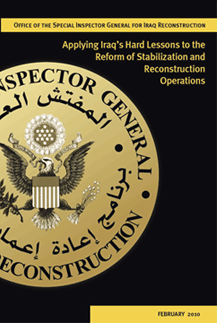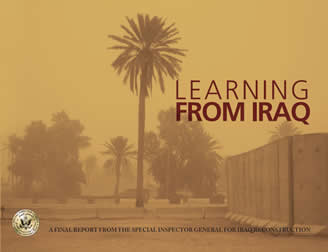
Learning From Iraq A Final Report From the Special Inspector General for Iraq Reconstruction
A Final Report From the Special Inspector General for Iraq Reconstruction culminates SIGIR's nine-year mission overseeing Iraq's reconstruction. It serves as a follow-up to our previous comprehensive review of the rebuilding effort, Hard Lessons: The Iraq Reconstruction Experience.
This study provides much more than a recapitulation of what the reconstruction program accomplished and what my office found in the interstices. While examining both of these issues and many more, Learning From Iraq importantly captures the effects of the rebuilding program as derived from 44 interviews with the recipients (the Iraqi leadership), the executors (U.S. senior leaders), and the providers (congressional members). These interviews piece together an instructive picture of what was the largest stabilization and reconstruction operation ever undertaken by the United States (until recently overtaken by Afghanistan).
The body of this report reveals countless details about the use of more than $60 billion in taxpayer dollars to support programs and projects in Iraq. It articulates numerous lessons derived from SIGIR's 220 audits and 170 inspections, and it lists the varying consequences meted out from the 82 convictions achieved through our investigations. It urges and substantiates necessary reforms that could improve stabilization and reconstruction operations, and it highlights the financial benefits accomplished by SIGIR's work: more than $1.61 billion from audits and over $191 million from investigations.View.
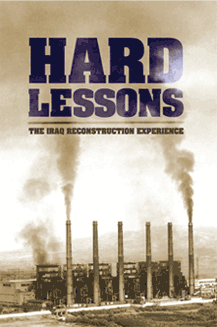
Hard Lessons: The Iraq Reconstruction Experience
Since the March 2003 invasion, the Congress appropriated about $50 billion in taxpayer dollars for Iraq's relief and reconstruction.
This generous provision funded a continuously evolving rebuilding program that sought, among other things, to restore Iraq's essential services, establish new security forces, create a free-market economy, and put the country on the path to achieving an effective democracy. Some of the initiatives succeeded but others did not.
Hard Lessons, the first comprehensive account of the Iraq reconstruction effort, reviews in detail the United States' rebuilding program, shedding light on why certain programs worked while others fell short of goals.
Since 2003, the U.S. Congress has appropriated more than $50 billion for the support of relief and reconstruction efforts in Iraq, including the restoration of the country’s oil and electricity sectors, the establishment of new security forces, and the strengthening of Iraq’s capacity to govern itself. A number of federal agencies—including SIGIR, the U.S. Army Audit Agency, the Inspectors General of the Directorates of Defense, State, and USAID, and the Government Accountability Office—have conducted oversight of and reporting on the expenditure of funds for Iraq relief and reconstruction activities.
This extensive body of work is available in studies, reports, audits, inspections, and congressional testimony covering issues that arose during the expenditure of U.S. government funds for or in Iraq. They range from the meticulous analysis of specific projects to broad overviews of entire programs and sectors. Most included recommendations for improving the management of reconstruction efforts now and in the future.
In 2008, the Congress established the independent, bipartisan Commission on Wartime Contracting to study U.S. wartime contracting in Iraq and Afghanistan. Its mandate is to study, assess, and make recommendations concerning contracting for “the reconstruction, logistical support, and performance of security functions” in both theaters from 2003 to the time of the commission’s final report in 2010. Its objectives include assessing “the systemic problems identified with interagency wartime contracting,” identifying instances of waste, fraud, and abuse and “ensuring accountability for those responsible. View.
Applying Iraq’s Hard Lessons to the Reform of Stabilization and Reconstruction Operations
This paper addresses–and proposes an innovative answer to– the question of who should be accountable for planning, managing, and executing stabilization and reconstruction operations (SROs).
The U.S. government's existing approach provides no clear answer. Responsibilities for SROs are divided among several agencies, chiefly the Department of State, the Department of Defense, and the U.S. Agency for International Development. As a result, lines of responsibility or accountability are not well–defined.
The disintegration of reconstruction management in Iraq occurred in part because no accountable, integrated, interagency management office existed to oversee and execute the reconstruction program. Therefore, SIGIR proposes the creation of a new office for planning, funding, staffing, and managing SROs: the U.S. Office for Contingency Operations (USOCO).
Creating USOCO could potentially prevent the recurrence of the kinds of breakdowns so often experienced in Iraq. Importantly, it would provide a single office whose sole mission would be to ensure that the United States is ready to go when the next contingency occurs, and provide someone to hold accountable for any failures in planning or execution. View.
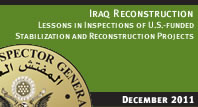 |
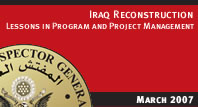 |
Lessons Learned In Iraq ReconstructionThe purpose of SIGIR’s Lessons Learned Initiative is to capture and apply the lessons learned from the Iraq reconstruction experience. In February 2006, SIGIR released Iraq Reconstruction: Lessons in Human Capital Management; in August 2006, SIGIR released Iraq Reconstruction: Lessons in Contracting and Procurement; and in March 2007, SIGIR released its third and final Lessons Learned report, Iraq Reconstruction: Lessons in Program and Project Management. These three reports help satisfy SIGIR's mandate from Congress to provide recommendations that promote economy, efficiency, and effectiveness in the administration of the reconstruction program in Iraq. View. |
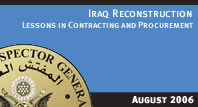 |
 |
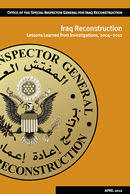
Lessons Learned: from Investigations, 2004−2012
The Iraq reconstruction experience produced a plethora of lessons about what happens when a stabilization and reconstruction operation (SRO) commences without sufficient systemic support in place.
Among the most salient is the need to provide a robust on-the-ground team of investigators and auditors from the outset of such an operation. The presence of strong oversight early on in an SRO would deter the kind of fraud, waste, and abuse that occurred all too often during the U.S. reconstruction program in Iraq.
Waste is the product of poor planning and weak controls. Abuse is bad management caused by insufficient systemic order. But fraud is the intentional wrongdoing by persons seeking to enrich themselves amid a chaotic and often kinetic environment.
This report focuses on fraud and the other white-collar crimes that occurred in the course of the Iraq rebuilding endeavor, eliciting a series of lessons drawn from criminal investigations conducted by the Special Inspector General for Iraq Reconstruction (SIGIR), outlining illustrative examples of major cases, and suggesting best practices for future SROs that could obviate or reduce criminality. There will always be crooks in conflict zones who will try to take advantage of the chaos that wartime brings. But ensuring strong oversight in theater from the start of an SRO could stop many who might otherwise abuse the system; at the very least, it would increase the likelihood of catching those who do.
SIGIR investigators have served in Iraq since 2004, frequently under fire. The inherent disorder of life in a war zone—coupled with the challenges of starting up a new organization—meant that substantial investigative results came gradually. The incremental nature of this progress stemmed, in part, from the unpredictable character of the criminal investigative process, which is less structured and more desultory than the audit process. But significant results did come, and their numbers stand as silent testimony supporting the need for robust oversight during SROs. As of March 31, 2012, SIGIR investigations had yielded 86 indictments, 66 convictions, and more than $175 million in court-ordered fines, forfeitures, restitution payments, and other monetary penalties. View.

Lessons from Auditing
U.S.-funded Stabilization and Reconstruction Activities
In July 2008, SIGIR issued an audit report that identified key recurring systemic management issues. This Lessons Learned study builds on that report, documenting many lessons learned by SIGIR auditors from 2004 through 2012. The numerous problems uncovered in SIGIR's audits reduced program effectiveness and increased potential for fraud, waste, and abuse. If the causes and effects of these problems are not fully understood—and if actions are not taken to forestall their recurrence— then future stability and reconstruction operations (SROs) could experience similar negative outcomes.. View.

